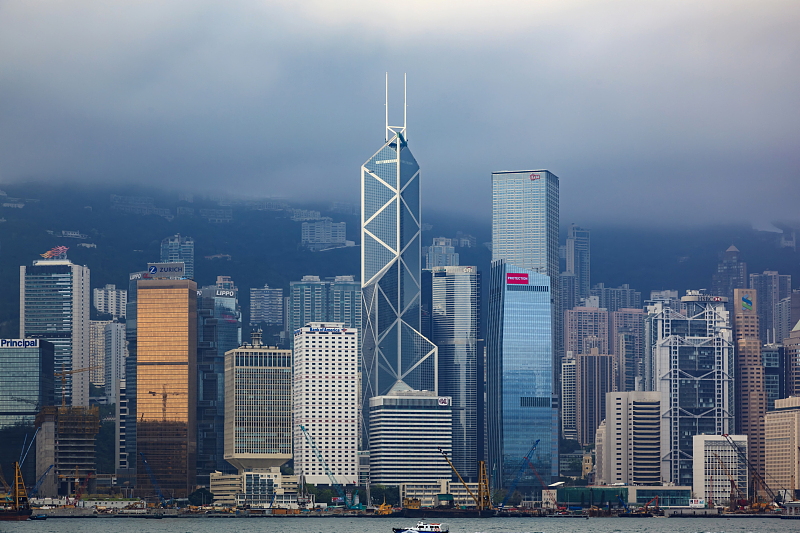Hong Kong set to tap resilience of residents
By Mark Pinkstone | China Daily Global | Updated: 2020-12-01 08:51

The mass resignation of the "pan-democrats" in Hong Kong's Legislative Council over the disqualification of four of its members who failed to uphold the terms of the Basic Law is indicative of how immature these elected members of the legislature are.
With the catastrophes of 2020-anti-government street riots, COVID-19, severe economic downturn, unprecedented unemployment and sanctions by the United States-Chief Executive Carrie Lam Cheng Yuet-ngor will be in damage control mode for 2021.
Of course, COVID-19 will be on top of her agenda, and for Hong Kong to get back to a new norm, she will aim for zero tolerance as soon as possible.
She has a good start with the impending exit from the US political theater of the Donald Trump-Mike Pompeo duo, who did nothing to instill trust and encourage cooperation. Instead, she will likely see the same Sino-US relations with greater conciliatory diplomacy under Joe Biden's administration, with the nomination of Antony Blinken, a State Department official in the Obama administration, as secretary of state.
Lam's recent policy address was very predictable, given the turmoil of 2020. It was not a happy year worldwide, particularly with the COVID-19 pandemic. But by taking sound scientific advice, Hong Kong has weathered the storm fairly well. However, it is not over yet, and on Wednesday Lam released preparations for the fourth wave of the pandemic.
With Hong Kong in the international spotlight, her address was greatly influenced by external forces, especially the abuse leveled by the US and echoed by other nations. This was totally uncalled for and without foundation, and the US call to strip Hong Kong of its "made in Hong Kong" label was the last straw. One of Lam's urgent priorities will be to restore the HKSAR's constitutional order and political system from chaos.
"Foreign governments and legislatures have intensified their interference in Hong Kong's affairs, which are squarely China's internal affairs, severely jeopardizing our nation's security," Lam said.
She will also dedicate a great deal of time to Hong Kong's young people, who were targeted by the US-based National Endowment for Democracy to actively instigate the riots of 2019-20. Among the more than 10,000 people arrested on suspicion of violating the law in connection with opposition to the proposed Fugitive Offenders Ordinance, 40 percent were students.
Lam will reexamine the liberal studies program introduced to Hong Kong's education system in 2009 by Executive Councillor Professor Arthur Li when he was secretary for education and manpower. The plan was good, until it was hijacked by the NED, which said in its 2012 annual report that it was allocating $460,000"to foster awareness regarding Hong Kong's political institutions and constitutional reform process and to develop the capacity of citizens-particularly university students-to more effectively participate in the public debate on political reform."
The US State Department found the liberal studies program to be an opportunity to penetrate Hong Kong's education system and, through the NED, undermine the patriotism of Hong Kong's young people. "We cannot bear to see that with the infiltration of politics into school campuses, students are drawn into political turbulence or even misled to engage in illegal and violent acts, for which they have to take legal responsibilities that will have an impact on their lives," Lam said on Wednesday.
Since its introduction four months ago, the National Security Law has been remarkably effective in restoring stability in Hong Kong, and Hong Kong residents can again enjoy their basic rights and freedoms according to the law.
To counter this foreign intervention in Hong Kong's education system, great effort will be devoted to strengthening young people's sense of national identity and patriotism. This is not new and is widely practiced by most places, including the US, the United Kingdom, the European Union, Australia and New Zealand, which are critical of our national security laws even though they have such laws themselves.
Political issues aside, the economy, severely battered by the COVID-19 pandemic, is of serious concern. With a HK$310 billion ($40 billion) deficit predicted for the current fiscal year, a far cry from Hong Kong's traditional surplus, the economy is expected to contract 6.1 percent this year.
However, Hong Kong people are resilient, and with new initiatives opening in the Guangdong-Hong Kong-Macao Greater Bay Area and the Shenzhen informational technology hub, they should recover faster than most economies. The Bay Area offers many opportunities, especially for postgraduates, but economic observers believe many will prefer to stay in Hong Kong when the pandemic subsides and job opportunities return to their normal state.
The author is a former chief information officer of the Hong Kong government, a public relations and media consultant and a veteran journalist.
























